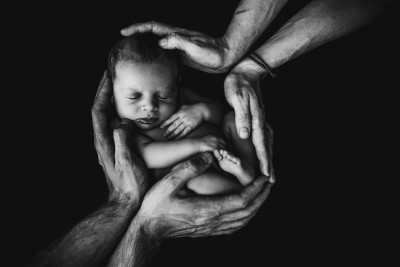What the Bible says about abortion and personhood

Contrary to what Joe Scarborough (anchor of “Morning Joe” on MSNBC) believes, Jesus’ teaching against abortion is clear: Whatever we do to “the least of these,” we do to Him.
In Matthew 25:31-46, Jesus is talking about receiving eternal life or eternal judgment. He explains the relationship between the way we treat our fellow humans and the way we treat Him. Providing food, water, shelter, and clothing for those in need is the same as providing food, water, shelter, and clothing for Jesus. Who was the first person to give Jesus food, drink, shelter, and clothing? Mary. She nourished, sheltered, and clothed him with her body. Jesus is the biblical pro-life argument.
Those who miss this truth are missing the forest for the trees.
Throughout Scripture, God’s teaching of the sanctity of human life involves personhood, destiny, and the Son who would redeem humankind. Long before He was born, Jesus was awaited with great anticipation. The Old Testament foretells His virgin birth, His birthplace of Bethlehem, and other numerous details about His life, death, resurrection, and eternal reign. Even before He was conceived, Jesus was known.
Although Americans debate the “personhood” of babies still in the womb, Scripture presents no such dilemma.
In Psalm 139:13, King David says God “formed my inward parts; you wove me in my mother’s womb”. Psalm 139:16 says that God has “seen my unformed substance and in Your book were all written. The days that were ordained for me. When as yet there was not one of them.” Likewise, in Jeremiah 1:5 God tells the prophet “Before I formed you in the womb I knew you, and before you were born I consecrated you. I have appointed you a prophet to the nations.” In Judges 13:5, God tells Samson’s mother “you shall conceive and give birth to a son, . . . the boy shall be a Nazirite to God from the womb.” Several verses later, God even instructs her to adopt a Nazirite’s diet during her pregnancy for the sake of her unborn son, saying, “you shall not drink wine or strong drink nor eat any unclean thing, for the boy shall be a Nazirite to God from the womb.”
The personhood of babies in the womb is also evident in the New Testament accounts of Jesus and John the Baptist. In Luke 1:15, the angel Gabriel told Zacharias that he and Elizabeth’s future son (John the Baptist) “will be great in the sight of the Lord; and . . . will be filled with the Holy Spirit while yet in his mother’s womb.” And when Gabriel told Mary she would conceive Jesus by the Holy Spirit, he also told her that Elizabeth (her relative), was already six months pregnant. Mary then hurried to the hill country to visit Elizabeth. Luke 1:41-44 describes what happened when Mary arrived:
When Elizabeth heard Mary’s greeting, the baby leaped in her womb; and Elizabeth was filled with the Holy Spirit. And she cried out with a loud voice and said, ‘Blessed are you among women, and blessed is the fruit of your womb! And how has it happened to me, that the mother of my Lord would come to me? For behold, when the sound of your greeting reached my ears, the baby leaped in my womb for joy.
Mary stayed with Zacharias and Elizabeth for three months, probably leaving just after John was born. This means that when the unborn John the Baptist was reacting to the unborn Jesus in Mary’s womb, Jesus had to have been in the earliest stages of human development. Scripture clearly treats both John and Jesus as recognizable “persons” before their births.
Along these same lines, the incarnation itself is a testimony to the personhood of humans from the moment of conception. It was the Holy Spirit who miraculously provided the male chromosomes to fuse with the female chromosomes in Mary’s oocyte during mitosis. But conceiving a child before she and Joseph had consummated their relationship put Mary and Jesus’ entire future in jeopardy.
In the first century, betrothals were as legally binding as marriage. Joseph believed Mary had committed adultery and was considering quietly divorcing her (“quietly” to protect her from public humiliation and possible stoning). Had he divorced Mary, Jesus would have been considered her illegitimate child and, if she hadn’t been stoned, her chances of marrying another man would have been greatly reduced. Had an “angel of the Lord” not explained the circumstances to Joseph, Mary and Jesus would likely have faced a life of poverty and scorn.
So why didn’t God spare Mary the risk, and Joseph the heartache by simply “taking over” an egg already fertilized by Joseph after he and Mary were married? After all, Spirit-led human prophets had appeared throughout Jewish history; Jesus could have been a holier hybrid, totally controlled by the Holy Spirit.
But controlling us isn't something God does. He respects our individuality and He allows us to make choices and to be our own persons. We know from science that every person is different.
God refused to usurp the life/personality of a manmade child. Jesus is God’s Son biologically as well as spiritually. He has His Father’s traits, and because He is His Father’s Son, He can say “He who has seen Me has seen the Father.” (John 14.9). Thus, the incarnation underscores both the divine nature of Jesus and the personhood of human beings from the moment of conception.
We like making our own choices. Many may be surprised to learn that abortion was widely practiced in the first century. It would have been unusual for a young Jewish girl to reject the strong teaching of her people regarding the sanctity of human life, but Mary could have done so out of fear. She potentially had a lot to lose. But in Luke1:38, when the angel told her she would conceive a son by the Holy Spirit, her response was, “Behold, the bondslave of the Lord; may it be done to me according to your word.” Mary chose the way of self-sacrifice, not self-protection. Jesus, too, chose the way of self-sacrifice — we have hope for eternal life with God because Jesus lives. And Jesus lives because Mary chose life.
Lori Shire is a graduate of Ashland Theological Seminary and a freelance copyeditor for Christian academic publishers.




























